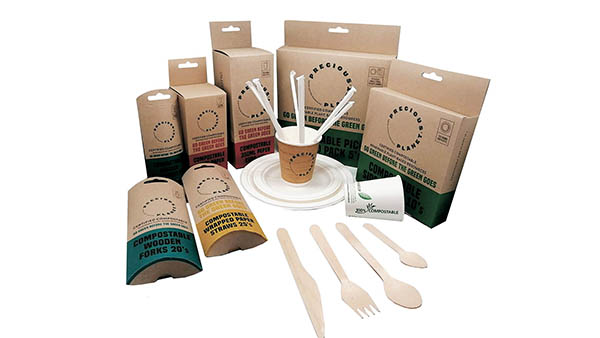
Derek Couzens, Commercial Executive at Rialto, a member of the Libstar family, says, “In 2018, we started off with just five biodegradable and compostable products in our Food Service offering. Now, we have over 120 and counting, including our Precious Planet range of our enviro-friendly packaging products. By the end of the year, we are aiming for 40% of all our Food Service packaging to be entirely sustainable, either recyclable, biodegradable, or compostable. That is essential if we are to do our part in being responsible corporate citizens.”
Going around in circles
A circular economy is an economic model designed to minimise waste by moving away from single use materials and encouraging sustainable production techniques. From a packaging perspective, this means creating and utilising materials that can be recycled, used as compost or reused repeatedly. For example, the push for creating circular economies has fuelled the use of bagasse, a waste product of sugarcane, as a sustainable packaging solution.
As things stand, recycling is one of the best practical examples of what circular economies could look like. To contribute to reducing waste and increasing recovery, as well as the recycling and reusing of materials in the South African market, Extended Producer Responsibility (EPR) fees were introduced locally in November 2021. Rialto too has moved quickly to achieve compliance.
In Europe large portions of waste are either incinerated or exported, and therefore have a lower recycling rate compared to South Africa where very little waste is incinerated. In 2019, South Africa achieved an output recycling rate of 23,4% versus 7,9% recycling rate for Europe.
According to the Paper Manufacturers Association of South Africa (Pamsa), in 2022 the local recycling rate of paper and board in South Africa is 70% versus the global rate of 59.1%.
‘Generation Sustainability’
Couzens says, “The research we have encountered shows that 83% of millennial consumers prefer to pay more for sustainable packaging. This, in turn, has led to some sustainable products growing at a rate of more than seven times that of non-sustainable ones. That means being environmentally ethical is not just the right thing to do, it is also an ultimate sustainable value-add to one’s business and business partners.”
Couzens concludes, “Everyone has a role to play, and the key is the acceptance of our roles. In the past that has been problematic, but we are seeing encouraging signs. For our part, the job is to make sure that our manufacturing and packaging processes are as green and eco-friendly as we can possibly make them. Companies that fail to take sustainability seriously will have a hard task attracting the customers of the future.”






